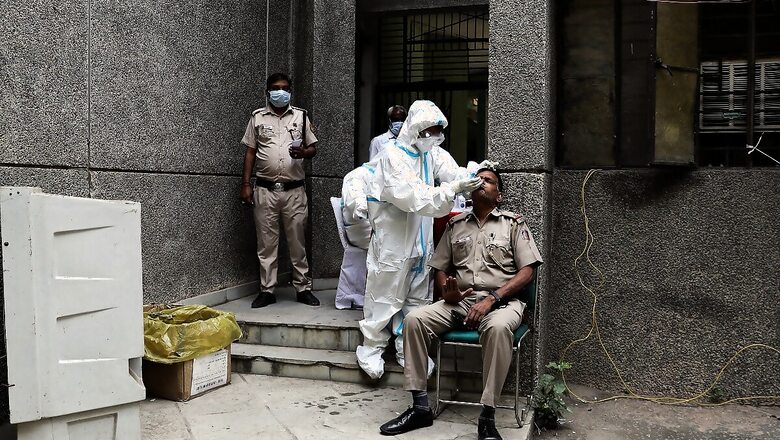
views
The twin factors of rising air pollution and a surge in COVID-19 cases have increased the burden on Delhi's hospitals with the number of vacant beds shrinking fast and out patient departments (OPDs) witnessing a spike in footfall, doctors said on Saturday. Besides, the ICU beds with ventilators at most top private hospitals and major Centre-run facilities are also getting filled up with spiralling cases in the last few days.
Delhi recorded over 7,000 COVID-19 cases for the first time, taking tally to over 4.23 lakh on Friday, while the toll rose to 6,833 with 64 more deaths, authorities said. The 7,178 fresh cases came out of the 58,860 tests conducted on Thursday, while the positivity rate stood at12.19 per cent amid the festive season and rising air pollution in the city, according to the bulletin issued by the Delhi health department.
The previous highest single-day spike was 6,842 cases recorded on Wednesday. The number of daily cases had crossed the 6,000-mark for three consecutive days from November 3-5. Sixty-four new fatalities were recorded, pushing the death toll in the national capital to 6,833. On Thursday, 66 fatalities were reported from COVID-19.
The air quality in the national capital has also deteriorated and greater movement of people in public places, especially crowded areas such as markets and shops, and laxity in adhering to safety norms, have led to surge in cases, experts have said. Rana A K Singh, Medical Superintendent at RML Hospital said, there is a rise in the number of patients visiting the hospital with complaints of respiratory problems probably due to spike in pollution levels and because of change in weather. "On top of that, the number of COVID-19 patients coming to the hospital has also increased," he said.
"Our COVID and non-COVID ICU facilities are at full capacity and to create ICU beds at the stroke of the hammer is not possible because it requires equipment and manpower," Singh said. Large number of coronavirus positive patients who come with complaints of breathlessness become better with high-flow oxygen therapy for which one requires a special equipment (high-flow nasal), which is in adequate numbers, he said.
There is an increase in the number of patients visitingthe OPD seeking treatment for respiratory related ailments, said another doctor at a leading hospital, who did not wish to be identified. Those already suffering from respiratory diseases like asthma, COPD or fibrosis etc are facing exacerbation of the symptoms, he added. "Also, healthy people are coming with complaints like dry cough, throat irritation, nasal congestion and feeling of malaise which may be directly related to sudden spurt in pollution levels," the doctor said. "There is an emergent need to curb the pollution levels as the likely morbidity in this season where COVID-19 also is affecting lungs adversely will increase," the doctor added.
p>The online coronavirus dashboard of the Delhi government showed that at 6.30 pm, out of 1,253 ICU beds with ventilator facility, only 250 were vacant. At Max hospitals in Saket, four out of 51 ICU beds with ventilators were vacant, while at Sir Ganga Ram Hospital, the number was 16 out of 45. At St Stephen's Hospital, the vacancy showed nil, while at RML Hospital, 6 out of 28 beds were vacant, and at Lady Hardinge Medical College and Hospital, 7 out of 17 beds were available.
However, at Rajiv Gandhi Super Speciality Hospital (RGSSH), a dedicated COVID-19 facility under Delhi government, 116 of the 200 such beds were vacant. Air pollution may increase transmissibility of the coronavirus making people more vulnerable to the disease and aggravating the COVID-19 situation, experts had recently said, while warning that those who have had the infection in the past may also have to face new challenges.
Vivek Nangia, principal director and head of pulmonology at Max Super Speciality Hospital, Saket asked people to exercise extreme caution this Diwali as COVID-19 and pollution can compound the problems. "Due to low temperatures and increased air pollution particulate matters remain suspended in the air for a longer period and increase transmissibility of the novel coronavirus, making people more vulnerable to the disease," he said. The second mechanism linking increased COVID-19 cases and mortality due to air pollution is that exposure to polluted air is known to cause inflammation and cellular damage, making it easy for the virus or any other pathogenic microbe to invade our lungs, he said.
This process of inflammation may suppress early immune response to infection, making an individual more susceptible, he added.
Read all the Latest News, Breaking News and Coronavirus News here




















Comments
0 comment